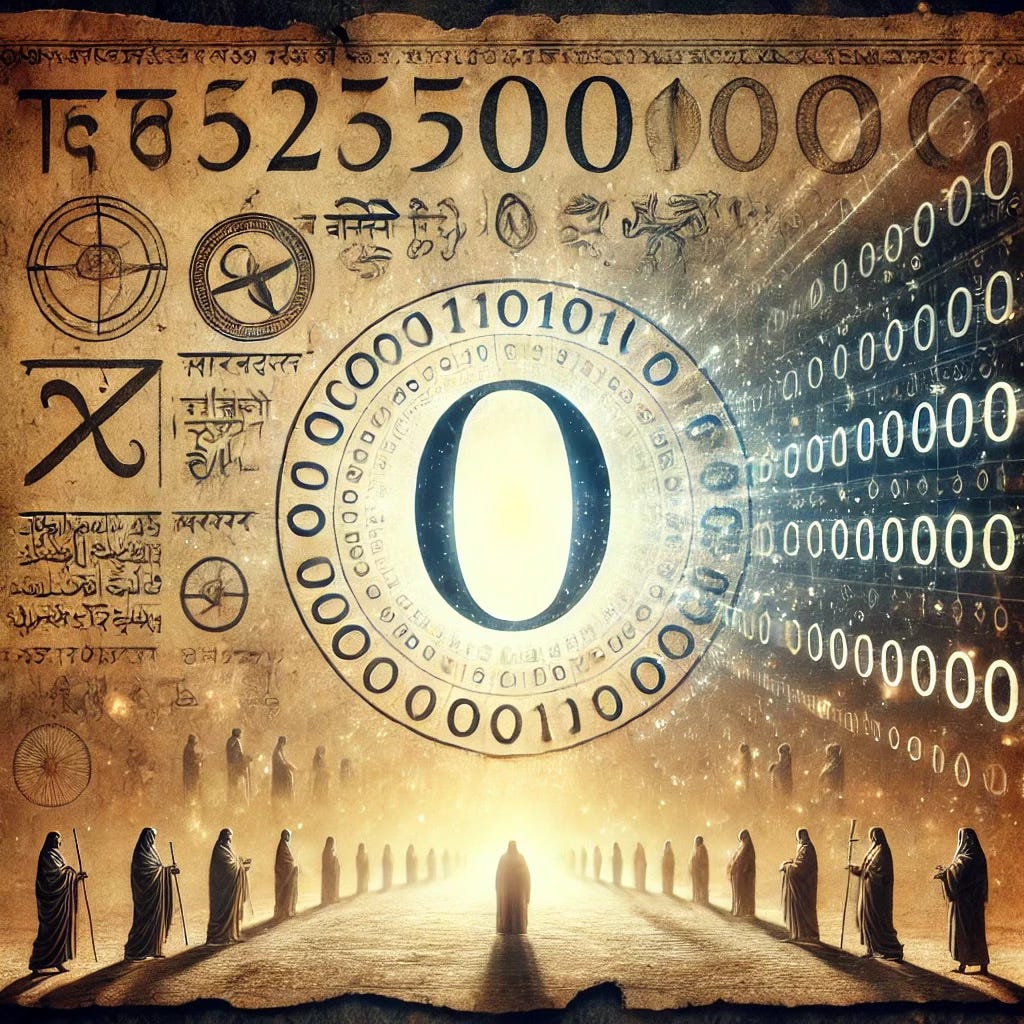Zero is nothing, yet it’s the start of everything.
Welcome to “Students of Leadership”, today to talk about the captivating history of the number zero. In a world where numbers govern our lives, no number has shaped our understanding of reality as profoundly as the number zero. Our journey today will reveal not just its mathematical significance but also its leadership implications for humanity.
Zero is both the void and the foundation, the absence and the possibility. Zero represents the leadership paradox of having the courage to create something from nothing, and the wisdom to embrace the unknown.
To understand zero is to understand the power of a new perspective, it’s an invitation to a journey to think differently. The idea of zero is at the core of breakthrough thinking because zero is more than a number; it is a challenge to the status quo that won.
The Birth of Zero: A Revolutionary Idea
Imagine a world where there is no way to express nothingness.
Ancient civilizations counted with numbers but had no formal representation for the absence of value. For centuries, the concept of "nothing" was either ignored or considered too dangerous to acknowledge, it implied uncertainty, and uncertainty was to be feared.
The first idea of zero dates back to around 5,000 years ago to the Sumerian and Mayan cultures, where zero debuted as a placeholder to represent the absent of a digit in a string of number. Imagine the representation of 205 before zero, how do you express that in the 10s column there is nothing so it doesn’t get confused with 25? This is zero as a placeholder allowing us to add and subtract in an easy way. Placeholder notation enables working out complicated math problems on a piece of paper. Try for example doing this using roman numbers!!
However it is in India around 2000 years ago where a revolutionary breakthrough occurred: the formalization of zero as a number, the signification of nothingness. Later in the 7th century, the Indian mathematician Brahmagupta explained what’s recognized as the first description of zero in arithmetics in history:
When zero is added to a number or subtracted from a number, the number remains unchanged. When a number multiplied by zero becomes zero.
Zero is not a trivial mathematical refinement but a philosophical awakening. The idea of zero represented a radical shift in human cognition, which would ultimately propel advances in algebra, calculus, physics, and the very foundations of digital computing.
But zero did not spread easily, when it traveled to the Arab world through the works of scholars like Al-Khwarizmi, it was embraced as a tool for progress. But when it reached Europe, it encountered fierce resistance. The Catholic Church initially saw zero as a dangerous symbol of chaos, a risk to the traditional belief systems.
Yet, like all great ideas, zero not only persisted but slowly wove into the fabric of commerce, engineering, and science.
The creation of zero stands as one of the most transformative breakthroughs in mathematics because zero fundamentally redefined the concept of nothingness, which enabled a shift from concrete counting to abstract reasoning. This singular innovation paved the way for algebra, calculus, and modern computational theory, inviting mathematicians to explore the rich interplay between absence and presence, a duality that continues to challenge and inspire our understanding of the mathematical universe. Our entire digital world is built on the binary foundation of zero and one.
“The Babylonias invented it, the Greeks banned it, the Hindus worshiped, and the Church used it to fend off heretics. (…) Zero is the strangest number in the universe and one of the greatest paradoxes of human thought” ZERO, The Biography of a Dangerous Idea” by Charles Seife.
If a single idea, once feared and marginalized, could become the cornerstone of modern civilization, what lessons does this hold for leaders facing resistance, doubt, and uncertainty?
An Unconventional Leadership Journey: Lessons from Zero
The story of zero serves as a masterclass in leadership because it is a story of audacity, transformation, and endurance. It offers timeless insights for those who dare to innovate, challenge conventions, and lead with vision.
Embrace the Unknown
The pioneers who conceptualized zero ventured into intellectual territory that had never been explored before.
Leadership must be willing to step into the unknown, to embrace uncertainty rather than fear it. The greatest breakthroughs often arise not just from what is yet to be discovered but what is considered impossible.
Challenge the Status Quo
Zero faced relentless opposition, yet it prevailed.
Leadership must question existing norms and dare to think differently when the challenge at hand deserves the boldest moves. The resistance you face today will likely be the prelude of tomorrow's revolution.
Turn Absence into Opportunity
Zero teaches us that even nothingness holds value.
Leadership sees potential (in talent, in opportunities, in strategies) where others see void.
Cultivate Interconnectedness
Zero bridges positives and negatives, presence and absence, unity and individuality.
Leadership that recognizes the importance of balance between confidence and humility, authority and empathy, ambition and patience, will be the type that will create high and sustainable impact.
Persist Despite Resistance
The adoption of zero was slow and met with fierce resistance, yet it ultimately became indispensable.
Leadership knows that real transformation takes time and persistence, repetition and iteration. What is dismissed today as radical will likely become essential tomorrow.
Reflections
Innovation is born from the courage to think differently. Zero was once unthinkable, yet it transformed the world.
Breakthroughs often come from what is unseen. Zero gave meaning to absence.
Persistence overcomes resistance. The new encounters always doubt and opposition, the key is to remain steadfast in your convictions.
Zero is not merely a number. It is a testament to the power of new ideas, the necessity of persistence, and the inevitability of change.
Zero teaches us that great leadership is about seeing (vision) what others do not, challenging what others accept (strategy), and persevering when others retreat (execution).
Let today’s newsletter serve as a reminder that everything great begins with the courage to envision something that has yet to exist.
P.S. Before I go, here you have “The Treat,” where I share some of the music that made me company while writing … Enjoy as you bid farewell to this post
“Lead yourself, Learn to live. Lead others, Learn to Build.”
If you enjoyed reading this post consider subscribing to the newsletter for free, joining the community and sharing your thoughts.






